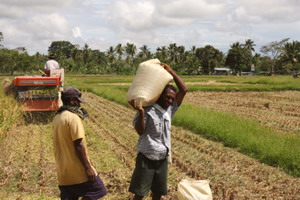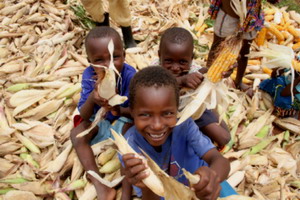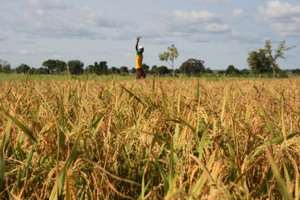
Whose Harvest? Land Grabs: Does Food Security for Some Mean Insecurity for Others?
|
|
Philip Hugh Barber |
One thing follows another. First came a global financial crisis; then came a series of food crises driven not only by supply and demand, but also by speculation as the world's bankers scrambled for relative security. Now, if recent media reports are anything to go by, these food crises are themselves the cause of a new kind of market speculation with implications for those in poverty: the large-scale acquisition of farmland.
This emerging issue is proving to be controversial. In the most famous – or infamous – case to date, Daewoo Logistics Corporation, the South Korean conglomerate, was reported to have secured 1.3 million ha of land in Madagascar, representing about half of the agricultural land available on the island. The company had planned to cultivate maize and corn to reduce South Korea’s reliance on costly US and South American imports, but the issue proved to be so divisive within Madagascar that it contributed toward a change in government. The new president canceled the deal on taking power in March.
|
Over the past year or so, similar stories in the media have described how the corporations and – occasionally, through sovereign wealth funds – governments of certain nations have sought opportunities to develop overseas farmland through "investments," "land acquisitions," and "land grabs." The phenomenon has even been described as a form of "neo-colonialism," in which the rich use their financial influence to exploit the poor. Still, all of these terms describe essentially the same action: the lease or purchase of land in one country by an overseas investor, intending to produce food to supply a market back home. Ultimately, the intention is to ensure food security in that home country, as opposed to the local community; and depending on whether that investor is a private company or a government, may or may not involve making a profit along the way.
A quick glance at a list of recent or anticipated acquisitions reveals that a core group of nations tend to figure in many of these deals, and they all have one thing in common: they are – or will shortly become –net importers of foodstuffs. These nations are being driven to invest in overseas land by country-specific factors impinging on domestic food security, including limitations on physical space (South Korea; Japan); adverse environmental conditions, such as an absence or shortage of water and a lack of irrigated land (United Arab Emirates and other Middle Eastern states); anticipated population growth (India; China); or loss of arable land to industrial growth (India; China).
In addition to factors that have motivated individual countries to move into this area, certain issues of global influence appear to be driving a food security "bubble," in which "undeveloped" land is perceived to be in short supply, and seen as an increasingly valuable asset. A boom in biofuels has seen mixed-use farmland reallocated for the purpose of growing specific crops that generate energy, but don't get eaten; meanwhile, climate change is having an ever-apparent and often negative influence in many regions of the world, driving desertification and destroying previously fertile land. Shifting patterns of consumption also point toward the need for a greater need for grazing land as the world's newly enriched middle-classes grow and consume greater quantities of meat. All of these factors involve the reconfiguration of land away from its original use, and inflate the price of land left over as concerned parties continue to hedge their bets over its future availability.
|
These deals have often been billed as positive opportunities for the host country and the investor, with both sides having an incentive to sign deals. The investor invests in a chance to boost food supplies while the host country receives reciprocal benefits such as a stake in production outputs, infrastructure development, or training and employment opportunities for its citizens.
Perhaps for this reason, the governments of host countries are often willing to receive only a nominal payment or rent in return for the use of land, calculating that the benefits of inward investment into the country will secure long-term social and economic development. As part of this process, the recognition of land rights and existing claims by individuals and communities has become something of an issue. In Africa, for example, many tribes and communities have lived by a system known as customary tenure, meaning that land has been allocated locally — and allocated by the convention that whoever is using the land over a long enough period of time is assumed to have the right to do so. Many of these tribes and communities are pastoralists, following centuries-old grazing patterns, so land that appears to be "unused" may in fact be lying fallow, without anybody having abandoned their assumed right to use it (for examples of specific practices by country, see Land Grab or Development Opportunity? Agricultural Investment And International Land Deals In Africa [IIED/ FAO/ IFAD]). Legally speaking, land in these African countries is usually nationalized, and there are recurring questions about fair compensation for those who have used the land, and over the necessity of proper consultation prior to its sale or lease. Even if compensation is paid to the letter of the law, it is debatable – in some cases – whether the amount paid adequately offsets the losses incurred, and whether or not such compensation will even get to the right people.
The scale and complexity of each land acquisition varies greatly. Like all speculative endeavors, we might suppose that some will succeed and some will fail — although this might depend on whether success or failure is judged as a matter of development, profit or food security.
And here lies one of the biggest worries surrounding land acquisitions: not what is known, but what is unknown. To date, about 20 research articles have been produced by various organizations and institutions, analyzing the issue; meanwhile, the NGO GRAIN has collected a vast number of reported cases together on its blog. However, the real details of actual contracts between host governments and investors are virtually unknown.
|
Of course, these lack of public details can be justified for reasons of commercial confidentiality; but as a consequence, questions are asked and suspicions are raised. Have pilot studies looked at the consequence of planting swathes of landscape with monocultures? Will companies introduce genetically-modified species; will they account for the delicate balance of each local ecosystem? What will happen – politically, socially – if local citizens come to believe that a corporation is back-tracking on certain agreements? If harvests fail and fail to make a profit for a corporation, are they legally entitled to cut and run; are they no longer obligated to honor the "development" side of the deal? Since the legal questions raised by these contracts remain unanswered, the first details might emerge only when something fails. And by this point, it could be too late for the development of a nation or the welfare of individuals and communities.
Like any other commodity, food is something that is to be traded, as it has been for millennia; and within the framework of international regulations, every party is free to act as it wishes. Yet if corporations from developed nations are able – or are "seen" to be able – to bypass established markets, an already delicate balance could be tipped over into a vicious circle of instability. It is too early to draw firm conclusions, but one challenge seems clear: Whatever happens, the international development community should ensure that food security for some is not gained at the expense of food insecurity for others.
- 更新日期: 2022/05/18
- 點閱次數:834



